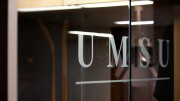Dozens of questions came from students for candidates in the 2012 UMSU election. Some were pointedly critical of candidates’ platforms and political ideals.
Members of the United slate, independent presidential candidate Aaron Griffiths, aboriginal student community representative candidate Kyra Wilson, and international student community representative candidates Moazzam Faisal and Monica Igweagu were all present.
Several students posed questions about what realistic goals each slate would like to achieve.
Bilan Arte, presidential candidate for the United slate, stated that her slate would like to work on bringing a universal bus pass to the university, and lobbying against parking restrictions associated with event days at the new Blue Bomber stadium.
Griffiths, who is running the No More Tears campaign and took to the stage in his karate uniform, said that he would put a priority on finishing the new UMSU-owned pub.
“It should have been finished already,” he said.
One student asked members of the United slate how their campaign stood apart, arguing that their goals appeared similar to slates that have run in past years.
Kwesi Bruce, candidate for vice president (external), said that he would like students at the University of Manitoba to take pride in their campus in the same way that other universities do.
Justin Paquin, candidate for vice-president (internal), said that he would work to ensure the university’s campus-wide ban on party buses will be lifted.
“If we haven’t removed that ban one year from now, we haven’t done our job.”
He went on to say that he thought the addition of the new stadium to campus could create opportunities for events on campus during or after Bomber games.
Bilan Arte, presidential candidate for the United slate, was asked about her involvement with and support for Students Against Israeli Apartheid, and whether this conflicted with her campaign goals of creating a greater sense of community on campus if the involvement could alienate certain students.
Arte responded that she felt it was really important to raise awareness of and encourage discussion about human rights on campus and that the university campus should be a place that is safe to facilitate discussion on “critical” issues.
Candidates were also asked what they felt UMSU was not doing.
“It would be easier to list what they are doing,” Griffiths said.
“[UMSU executive] need to stop chasing their own petty political ambitions,” and put more of a priority on doing things that will benefit students on campus, he argued.
Paquin stated that he felt UMSU should be surveying students more often and on a larger scale to find out what issues matter to them.
The United slate and Griffiths differed on their stance on the creation of the racialized students community representative, with the United stance in favour of the creation of the representative, while Griffiths said he was against it.
Arte said she felt it was important to acknowledge the experiences of racialized students.
Griffiths stated that he would not create a racialized student representative, but would create a “no hurt feelings” representative.
“It’s really just a catch-all representative for people who feel they have a grievance,” he said.
One question also came forward about candidates’ thoughts on UMSU’s involvement in promoting social justice campaigns on campus, and what they would do to involve students who are not necessarily concerned with social justice or political issues.
“In World War II, were we directly affected? Were those injustices happening across the ocean reflect on our values? Did it really matter? Yes it did, just like several other social injustices around the world,” Paquin responded.
“We need to make sure that we ask students what matters to them. We can’t advocate for every issue around the world, but what we need to do is ask students what’s import to them and advocate for those issues.”
Griffiths explained that he felt that social justice issues are sometimes conflated with student issues on campus, pointing to the Target Poverty campaign that UMSU was involved with during the 2009/2010 academic year.
“Were they targeting poverty and people who are actually starving to death, or are they talking about student debt? They’re not at all the same thing,” he said.
“Students may eat ramen for a couple years, but . . . starving to death, or living in substandard housing for generations is not necessarily a part of their lives. It’s arrogant to say that they’re the same situation.”
Members of the Free Radicals slate decided not to participate in the forum, explaining that they felt it would not be an effective way to communicate their campaign.
“The candidates are all on a stage while students are sitting below, so it’s not really a conversation with students,” said Chantal Shivanna Ramraj, candidate for vice-president external with the Free Radicals.
Ramraj went on to explain that the Free Radicals place a high priority on having consensus amongst each member of the slate in each campaign decision.
“The forum didn’t feel consensus based at all. You’re answering questions as individuals on the fly. What we’re about is making sure that everything we say is something we all agree with,” she explained.
Thianne Diop, the presidential candidate for the Free Radicals, said that she felt the forum had a hierarchical format that didn’t agree with the ideals of her slate.
She added that, if elected, she plans to change the position title to ‘vice-president president’ to eliminate any sense of separation from the rest of the executive.




